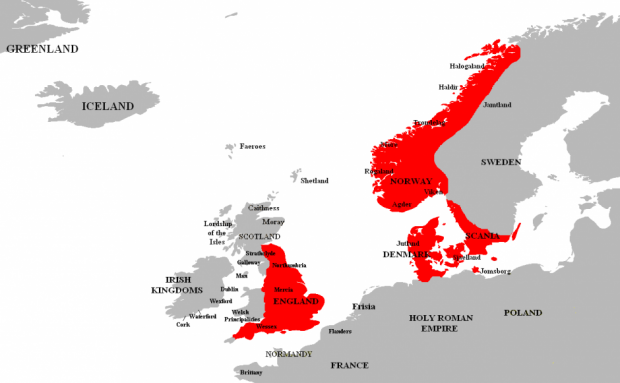Danish Vikings – why they moved to England – see http://sciencenordic.com/why-danish-vikings-moved-england/ … as many as 35,000 Danes decided to seek pastures new in the 9th and 10th centuries AD (a sort of re-enactment of the Anglo Saxon invasions – with an origin in Denmark and NW Germany). They were interested at first in portable treasures – especially gold and silver owned by the Church. After a while they settled and established the Danelaw – a sizable chunk of eastern England. Canute was king of England and king of Denmark. The big question here is – why did they abandon Denmark?
 … the same debate is at https://sciencenordic.com/new-study-reignites-debate-over-viking-settlem… … which refers to a study that claims between 20,000 and 35,000 Danes settled in England. This is in dispute with DNA evidence.
… the same debate is at https://sciencenordic.com/new-study-reignites-debate-over-viking-settlem… … which refers to a study that claims between 20,000 and 35,000 Danes settled in England. This is in dispute with DNA evidence.
At https://archaeologynewsnetwork.blogspot.co.uk/2017/03/neolithic-spread-e… … whereas the spread of farmers through the Balkans and Eastern Europe was a pretty lengthy process in contrast the spread of farming through the Mediterranean towards Iberia was a fairly quick process. Did farmers reach Ireland and western Britain before farmers spread from the continent in around 4150BC?
 … Meanwhile, it is not always prudent to let archaeologists dig holes on your land. A story in The Times a couple of weeks ago, was about a farmer in Norfolk who planned to dig out a pond to soak up access water in his fields when he inadvertently dug up an Anglo Saxon burial site. He had actually paid for a commercial archaeology company to investigate the area he was about to work on but they came up blank. The farmer then went ahead with excavating his pond, which was a large pond, and was forced to call a halt after discovering the burial site. Archaeologists duly arrived on the scene and unearthed 81 hollowed out oak coffins and 6 plank lined graves, and the remains of a timber church. All this was at the cutting edge of archaeology -shedding light on Christianity in the Anglo Saxon period. However, after the excavations ended, months later, the landowner was left with a bill for £250,000 (and may go into bankruptcy). If he had not told the authorities about the burial site no one would have been any the wiser as he had conformed with the law and had paid for a survey by an archaeological company. This happens all the time with construction companies when they run across geological and palaeontological finds – but they have no support of the Law. Archaeology does – but should it impoverish people who are willing to comply with discovery of history?
… Meanwhile, it is not always prudent to let archaeologists dig holes on your land. A story in The Times a couple of weeks ago, was about a farmer in Norfolk who planned to dig out a pond to soak up access water in his fields when he inadvertently dug up an Anglo Saxon burial site. He had actually paid for a commercial archaeology company to investigate the area he was about to work on but they came up blank. The farmer then went ahead with excavating his pond, which was a large pond, and was forced to call a halt after discovering the burial site. Archaeologists duly arrived on the scene and unearthed 81 hollowed out oak coffins and 6 plank lined graves, and the remains of a timber church. All this was at the cutting edge of archaeology -shedding light on Christianity in the Anglo Saxon period. However, after the excavations ended, months later, the landowner was left with a bill for £250,000 (and may go into bankruptcy). If he had not told the authorities about the burial site no one would have been any the wiser as he had conformed with the law and had paid for a survey by an archaeological company. This happens all the time with construction companies when they run across geological and palaeontological finds – but they have no support of the Law. Archaeology does – but should it impoverish people who are willing to comply with discovery of history?
